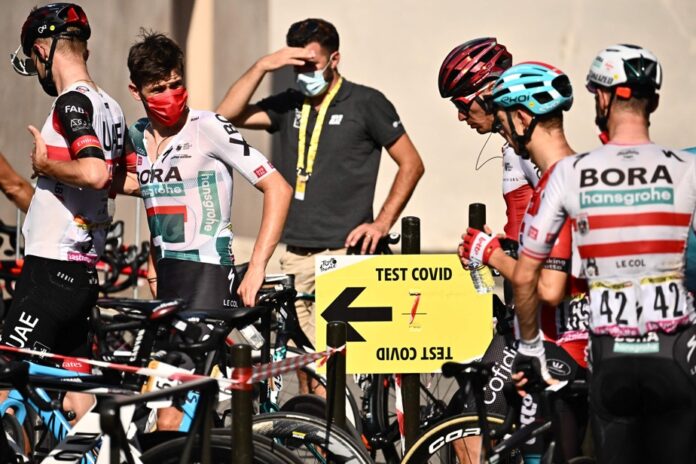(Bilbao) “We are the last to do it”: the microcosm of cycling resigns itself to living a new Tour de France under health protocol, unlike all other sports where COVID-19 seems to be only a distant memory.
While almost the whole world has put away the masks, they will have to be taken out of the closet on the Grande Boucle which leaves Saturday from Bilbao. As in the last three editions, followers, journalists and guests will have to wear it in contact with the runners.
Labels that were thought to have disappeared, such as “social distancing” are resurfacing: athletes are also instructed to avoid selfies and autographs.
“On the other hand, they will not wear a mask on the podium. We also don’t want a total contrast between everyday life and us”, underlines the director of the Tour, Christian Prudhomme to AFP who himself regrets not being able to “shake hands with the riders” for the fourth edition of following.
Nothing in the UCI regulations, however, obliges the organizers of cycle races to impose such a protocol. Neither the teams to test their runners, nor even to exclude them from the race in the event of a positive test for COVID-19, as was the case at the height of the epidemic.
But Amaury Sport Organization (ASO), the Tour’s organizing company, wants to avoid the same mishap that plagued the Giro d’Italia, when Remco Evenepoel’s mid-term abandonment because of a positive test decapitated the race. .
So go for the precautionary principle, even if it means giving the impression of living in a parallel world. And to witness grotesque scenes where runners wear the mask to talk to the media before taking it off and going to kiss family and friends.
When thrown on the subject, most cyclists say they comply without flinching with sanitary measures. Often they even take the lead, like Julian Alaphilippe who, on the plane taking him to the Dauphiné, found that he had been “one of the only ones to wear a mask” because he had “really too much want to do the Tour”.
“We can see that the teams are tightening the screws themselves as the Tour approaches. The Jumbo-Visma (the team of outgoing winner Jonas Vingegaard) wear the mask all the time. They are very careful, ”underlines Prudhomme who recognizes that the situation can be challenging. “Recently some rugby players said to me: but why are you doing this? »
“We’re the last to do it. But once there’s COVID-19 in the peloton, and we’ve seen it on the Giro, it’s very hard to stop because you spend all day breathing each other’s air.” , underlines Thibaut Pinot with AFP.
Philippe Mauduit, sports director of the Groupama-FDJ team, says he is “divided” on the measures that his sport imposes, while the rugby players compete scrum on scrum before “kissing while drinking beers”.
“We know that there are plenty of other sports where we don’t control anything, neither doping nor COVID-19,” he told AFP. But my first reaction is to say: we protect the runners. »
In the event of a positive test, the principle shared by most teams is to send the runner home. “I don’t want to have the death of a 23-year-old on my conscience,” Soudal-Quick Step team boss Patrick Lefevere said of the reason for Evenepoel’s withdrawal from the Giro.
“We have runners whose lung functions have been affected. We want to be as preventive as possible in relation to complications. They are not numerous, but they are annoying, ”explains doctor Serge Niamke, medical manager of the AG2R-Citroën team to AFP.
In an endurance sport where every performance percentage counts, runners like Frenchman Arnaud Démare or German Simon Gescke took weeks to recover from COVID-19.
“We have realized for three years that there are riders who have never regained their level”, insists Philippe Mauduit, recalling that “cycling is a hyper-demanding sport where the match lasts between 4:30 and 6 h 30”.
And where COVID-19 is therefore still a subject.















